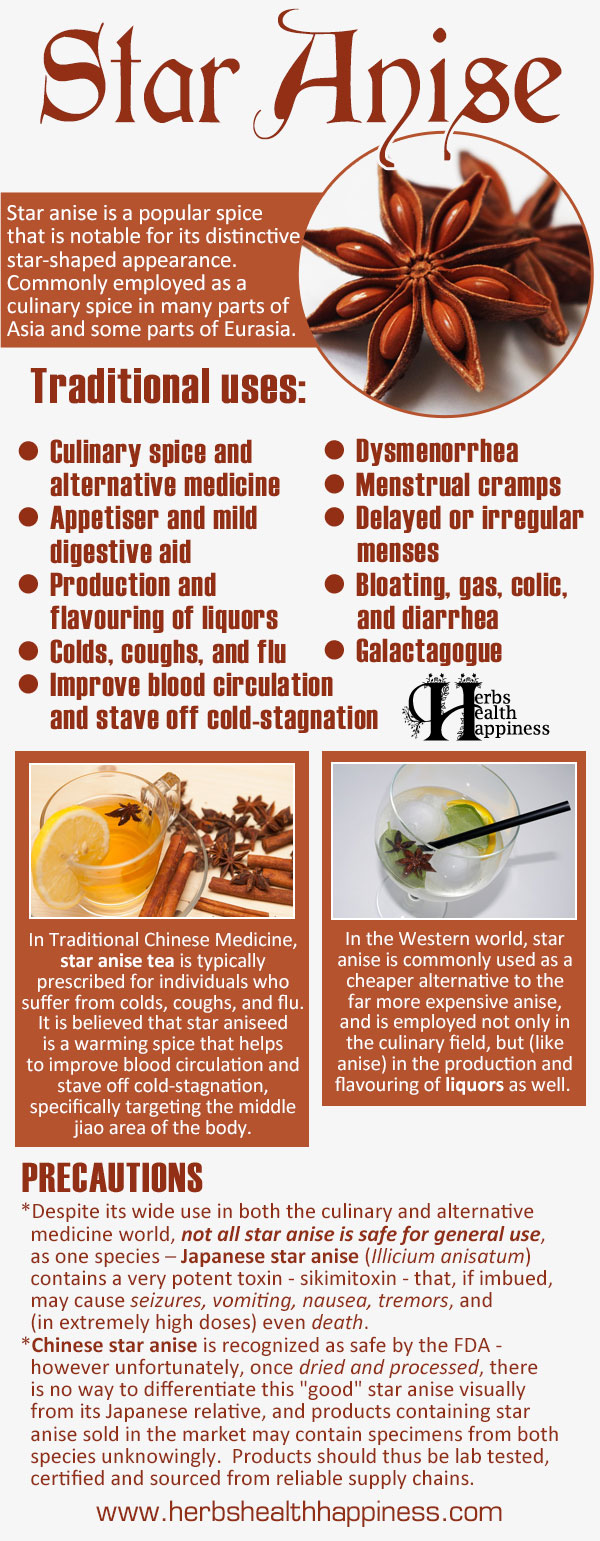Star Anise

Star Anise Uses and Benefits - image to repin / share
Infographic: herbshealthhappiness.com. Image source - Pixabay (PD)
Star Anise - Botany And History
Star anise is a popular spice that is notable for its distinctive star-shaped appearance. Commonly employed as a culinary spice in many parts of Asia and some parts of Eurasia, it is commonly mistaken for aniseed (Pimpinella anisum) mainly due to its similar flavor and aroma profile. This misconception usually stems from powdered specimens which no longer lack the identifying 'look' unique to star anise. Despite being used as a substitute for the more commonplace aniseed in most European applications, the star anise is a distinctly Asian spice with a long-standing medicinal reputation especially in Traditional Chinese Medicine. Star anise also plays a major role in Chinese, Vietnamese, Korean, and even Indian cuisine, and, like aniseed, is a very versatile spice.
The star anise plant is a medium sized evergreen bush that typically prefers shady areas, or places that obtain only moderate amounts of light. It is a native of China and Vietnam, although some species also thrive in Japan, Korea, India and Malaysia. Like true aniseed, it is the fruit of the star anise – a distinctly star-shaped pericarp – which is harvested and subsequently dried for use as either a medicine or a spice. Unlike true anise on the other hand, the star anise's leaves, bark, and roots do not possesses any known medicinal applications.
Star Anise - Herbal Uses
Like true anise, star aniseed is typically brewed into a mild decoction and drunk before or after meals to whet the appetite or to act as a mild digestive aid. In Indian cuisine, star anise is a key ingredient in garam masala - a unique blend of cooking spices meant to flavor meats and meat-based dishes. It is also a major ingredient in masala chai, an Indian spiced tea mixture typically prepared with a select blend of spices, black tea, milk, and jaggery or sugar. In the Western world, star anise is commonly used as a cheaper alternative to the far more expensive anise, and is employed not only in the culinary field, but (like anise) in the production and flavouring of liquors as well. [3]
In Traditional Chinese Medicine, star anise tea is typically prescribed for individuals who suffer from colds, coughs, and flu. It is believed that star aniseed is a warming spice that helps to improve blood circulation and stave off cold-stagnation, specifically targeting the middle jiao area of the body. Star anise tea may be employed as a remedy for various feminine complaints such as dysmenorreah, menstrual cramps, and delayed or irregular menses. Mild decoctions and very weak infusions can be employed to treat bloating, gas, colic, and diarrhea. Star anise, in moderate dosages, may even be used as a galactagogue thanks to trace estrogenic compounds that may help to encourage the production of breast milk in lactating individuals. [4]
An extract of one active compound found in star anise – shikimic acid – was a precursor to modern anti-influenza drugs. Because star anise contains highly significant amounts of the substance, it has become the primary industrial source of shikimic acid despite its bioavailability elsewhere. This compound is employed as raw material for the creation of anti-influenza medicines, of which many brands are now available in the market. Because of its use in the pharmaceutical industry, the majority of star anise produced in China is typically used a raw material for the production of drugs, while a lesser amount is employed for general uses. [5]
Star Anise - Esoteric Uses
In magickal practice, star anise is typically employed as an incense – a very commonplace practice in Japan, which employs a relative of true star anise - Illicium anisatum - as choice incense for Taoist and Shinto temples, and as funerary incense for graveyards. In Western magickal practice, star anise is associated with protection, increased psychic awareness, divination, and lust. Tisanes made of star anise may be drunk as an aphrodisiac or as an enhancer to one's inherent psychic abilities, while incense of star anise may be employed during invocation rituals, and during astral travels to protect and increase the magician's inherent abilities. [6]
Star Anise - Safety Notes
Despite its wide use in both the culinary and alternative medicine world, not all star anise is safe for general use, as one species – Japanese star anise (Illicium anisatum) contains a very potent toxin - sikimitoxin - that, if imbued, may cause seizures, vomiting, nausea, tremors, and (in extremely high doses) even death. Chinese star anise is recognized as safe by the FDA - however unfortunately, once dried and processed, there is no way to differentiate this "good" star anise visually from its Japanese relative, and products containing star anise sold in the market may contain specimens from both species unknowingly. [1]
Because of this possible danger, the FDA issued a warning on September 10, 2003, to avoid teas containing star anise. However the American Botanical Council responded quickly - stating that "The [USA] herbal tea industry many years ago developed laboratory techniques to be able to distinguish the safe Chinese star anise from the unsafe Japanese star anise. In-house quality control laboratories at herb tea companies in the U.S. employ microscopic analytical techniques as well as chemical tests to ensure that the herbal material they receive is the proper, safe herb before it is processed into herbal teas released to the commercial market.... Herbal teas sold by reputable companies in the United States are quite safe." [2]
Names of Star Anise, Past and Present
Chinese: bat gok / ba jiao / ba jiao hui
French: anis de Chine / anis etoile / anis etoile Chinois / badiane de Chine
Spanish: estrellado / badiana
Indian / Persian: badian / badian khatai
English: star anise / Chinese star anise / Japanese star anise / eight-horned anise / eight-horns / aniseed stars
Latin (esoteric): anisi stellati / illicium
Latin (scientific nomenclature): Illicium verum (Chinese star anise) / Illicium anisatum (Japanese star anise - toxic)
References:
[1] https://www.medicinenet.com/script/main/art.asp?articlekey=24284
[2] https://cms.herbalgram.org/press/staranisetea.html
[3] https://en.wikipedia.org/wiki/Illicium_verum
[4] https://chinesefood.about.com/od/chinesefoodglossary1/g/star_anise.htm
[5] https://articles.timesofindia.indiatimes.com/2011-02-06/diet/28356333_1_shikimic-acid-star-anise-illicium-verum
[6] https://windspirit57.tripod.com/id4.html
Main article researched and created by Alexander Leonhardt,
© herbshealthhappiness.com


1. Famous Chef Sheds 60lbs Researching New Paleo Recipes: Get The Cookbook FREE Here
2. #1 muscle that eliminates joint and back pain, anxiety and looking fat
3. Drink THIS first thing in the morning (3 major benefits)
4. [PROOF] Reverse Diabetes with a "Pancreas Jumpstart"
5. Why Some People LOOK Fat that Aren't
6. Amazing Secret Techniques To Protect Your Home From Thieves, Looters And Thugs
7. The #1 WORST food that CAUSES Faster Aging (beware -- Are you eating this?)
If you enjoyed this page:



























